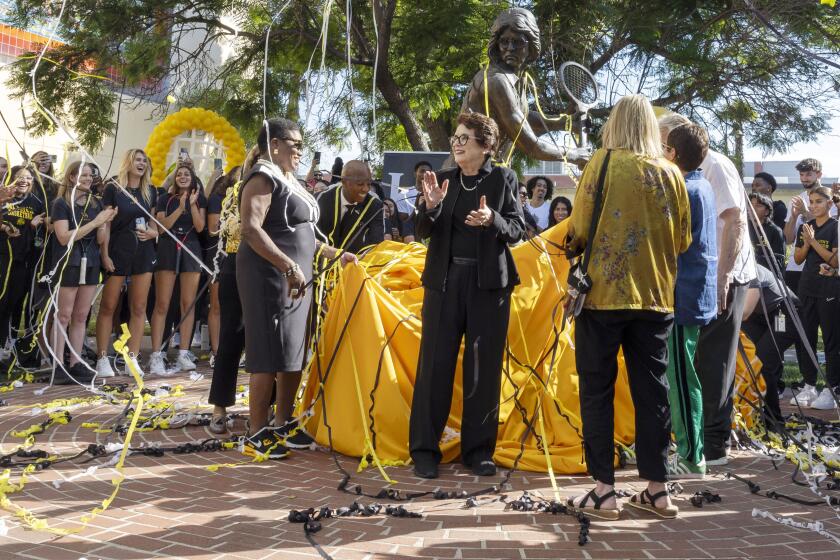Group seeks to repeal L.A.’s $800-million business tax, citing ‘anti-job climate’

- Share via
A group of business leaders submitted paperwork Wednesday for a ballot measure that would repeal Los Angeles’ gross receipts tax, delivering some financial relief to local employers but also punching an $800-million hole in the city budget.
The measure, called the Los Angeles Cost of Living Relief Initiative, would strip away a tax imposed on a vast array of businesses: entertainment companies, child-care providers, law firms, accountants, healthcare businesses, nightclubs, delivery companies and many others, according to the group
Backers said that repealing a tax long reviled by the business community would help address the city’s economic woes, creating jobs, allowing businesses to stay in the city and making the economy “more affordable for all Angelenos.”
“This initiative is the result of the business community uniting to fight the anti-job climate at City Hall,” said Nella McOsker, president and chief executive of the Central City Assn., a downtown business group.
McOsker, one of five business leaders who signed the ballot proposal, said city officials have “ignored the pleas of small- and medium-sized businesses for years.” As a result, scores of restaurants and other establishments, including the Mayan Theater, are closing, she said.
The filing of the ballot proposal immediately set off alarms at City Hall, where officials recently signed off on a plan to lay off hundreds of city workers in an attempt to balance this year’s budget. The city’s business tax generates more than $800 million annually for the general fund — the part of the budget that pays for police patrols, firefighters, paramedic response and other core services, City Administrative Officer Matt Szabo said.
“This measure is an assault on public safety,” Szabo, the city’s top budget official, said in an email to The Times. “Proponents of this measure will be directly responsible for cutting police or fire staffing in half if it passes.”
Mayor Karen Bass offered a similar message, saying the proposal would lead to reductions in public safety, homelessness initiatives and other city efforts that affect the business climate.
“We must continue to do everything we can to help businesses throughout Los Angeles,” she said in a statement. “This is the opposite.”
McOsker, asked about L.A.’s financial woes, said the city had a $1-billion shortfall this year and still succeeded in balancing the budget. She is the daughter of City Councilmember Tim McOsker, who sits on the five-member budget committee.
The measure is backed by executives and board members with various groups, including the Los Angeles Area Chamber of Commerce, the Greater San Fernando Valley Chamber of Commerce and the Valley Industry and Commerce Assn.
VICA President Stuart Waldman said the city’s economy has faltered amid a spate of increased taxes, higher city fees and new regulations. The most recent, he said, is the ordinance hiking the minimum wage for hotel employees and workers at Los Angeles International Airport to $30 per hour by 2028, which was approved by the City Council over objections from business leaders.
“We’re usually playing defense,” said Waldman, who signed the ballot proposal. “We’ve decided the time has come to play offense.”
The proposal, billed as the highest minimum wage in the U.S., would take the minimum wage for hotels and LAX workers to $30 by 2028.
The business tax proposal is part of a ballot battle being waged this year between businesses and organized labor.
Last month, a group representing airlines and the hotel industry turned in about 140,000 signatures for a proposed ballot measure aimed at overturning the hotel and LAX minimum wage. L.A. County election officials are currently verifying those signatures.
Unite Here Local 11, which represents hotel employees, responded with its own package of countermeasures. One would require a citywide election on the construction or expansion of hotels, sports stadiums, concert halls and other venues. Another would hike the minimum wage for all workers in the city, raising it to the level of hotel and airport employees.
Two other measures from Unite Here take aim at companies that pay their CEOs more than a hundred times their median employee in L.A., either by forcing them to pay higher business taxes or by placing limitations on their use of city property.
The ballot battle is “escalating in ways that are reckless and disconnected from the real work of running a city,” said Councilmember Katy Yaroslavsky, who heads the council’s budget committee. Yaroslavsky, in a statement, said the fight is “unproductive and needs to stop.”
“We just closed a billion-dollar budget gap, and basic services are already severely strained,” she said. “You don’t fix that by removing one of our largest revenue sources with no plan to replace it. We have to fix what is broken and that requires working together to offer real solutions.”
Bass, after signing the city budget, said Council President Marqueece Harris-Dawson made a commitment to find the funds to add another 240 LAPD officers over the next year.
Josué Marcus, spokesperson for the Los Angeles city clerk, said proponents of the latest ballot measure would need to gather about 140,000 valid signatures for it to qualify. The next city election is in June. McOsker, for her part, said she believes that state law sets a lower threshold — only 44,000 — for measures that result in the elimination of taxes.
Industry leaders have long decried L.A.’s business tax, which is levied not on profits but on gross receipts — even when an enterprise suffers financial losses.
Former Mayor Eric Garcetti argued for eliminating the tax more than a decade ago, saying it puts the city’s economy at a competitive disadvantage. Once in office, he managed only to scale it back amid concerns that an outright repeal would trigger cuts to city services.
Organizers of the latest proposal said it would not rescind business taxes on the sale of cannabis or medical marijuana, which were separately approved by voters.
More to Read
Sign up for Essential California
The most important California stories and recommendations in your inbox every morning.
You may occasionally receive promotional content from the Los Angeles Times.
















